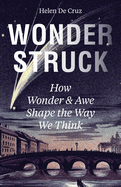
Helen De Cruz, a philosophy professor who holds the Danforth Chair in the Humanities at Saint Louis University, expands Plato's famous statement in Theaetetus that "philosophy starts nowhere else but with wonder" in Wonderstruck: How Wonder and Awe Shape the Way We Think. She locates the experiences of wonder and awe at the crux of the vast array of human endeavors, including science, art, religion, magic, and more, which she terms "cognitive technologies." These activities stem from a sense of curiosity and a desire to question, explore, and make sense of the world. The author refers to these as "self-transcendent" emotions: they take people out of themselves, underscoring their participation in and deepening their connection with the world.
De Cruz's intellectually ambitious work also delves into the psychological underpinnings of this transcendence, offering insight into humanity's openness to new ideas, its sense of hope during times of uncertainty, and its resilience during hardship. She traces the ways that humans have understood the experience of wonder through history. In her marvelous, multifaceted discussion, Wonderstruck assures readers that the world is teeming with possibilities and mystery, if only they're able to take the time to look. "Wonder requires attention, and a lot of that is captured by others, such as social media companies, for their own ends," De Cruz writes. By reclaiming access to wonder and awe, readers will not only enrich their own lives but also tap into resources for confronting both personal and global challenges. --Elizabeth DeNoma, executive editor, DeNoma Literary Services, Seattle, Wash.

